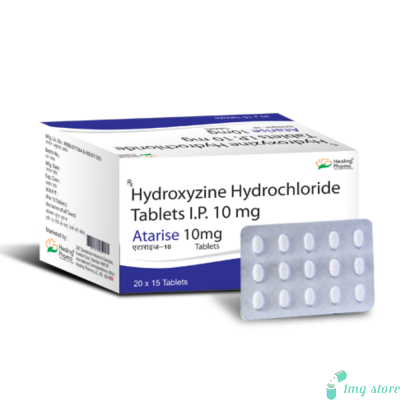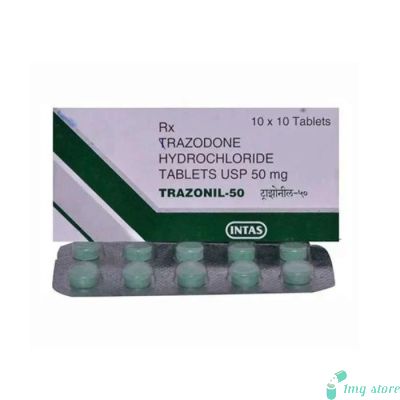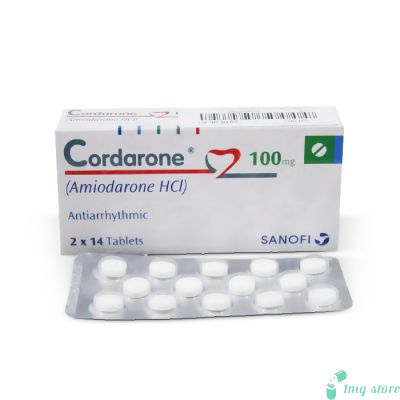Atarax Tablet (Hydroxyzine)
Hydroxyzine is a medication commonly prescribed to relieve itching caused by allergies. It belongs to the class of antihistamines and functions by blocking the activity of histamine, a natural substance produced by the body during an allergic response.
Atarax, also known by its generic name hydroxyzine, is a medication commonly prescribed for various conditions. It belongs to a class of drugs called antihistamines, which help to reduce allergic reactions and relieve symptoms associated with allergic conditions. Hydroxyzine is available in tablet form and is taken orally.
Here are some key points about Atarax (Hydroxyzine):
Uses: Atarax is primarily used to treat itching caused by allergies, hives (urticaria), and other skin conditions. It can also be prescribed to manage anxiety, tension, and as a sedative before and after surgical procedures.
Allergy Relief: Hydroxyzine works by blocking the effects of histamine, a substance released by the body during an allergic reaction. This helps to alleviate symptoms such as itching, redness, swelling, and rashes.
Anxiety Treatment: Atarax can be used to manage anxiety and tension by acting as a sedative. It affects certain chemicals in the brain, helping to induce a calming effect.
Dosage: The dosage of Atarax may vary depending on the condition being treated and individual factors. It is important to follow the instructions provided by your healthcare provider and not exceed the prescribed dose.
Precautions: Before taking Atarax, inform your doctor about any allergies you may have, especially to hydroxyzine or similar medications. It is also important to disclose any medical conditions, such as glaucoma, heart disease, liver problems, or urinary retention. Atarax may not be suitable for everyone, and your doctor will consider these factors before prescribing it.
Side Effects: Common side effects of Atarax may include drowsiness, dizziness, dry mouth, blurred vision, and constipation. It is advisable to avoid driving or operating machinery until you know how this medication affects you. If you experience any severe side effects or an allergic reaction, seek medical attention immediately.
Interactions: Atarax may interact with other medications, such as certain antidepressants, anticholinergic drugs, and sedatives. Inform your doctor about all the medications, supplements, or herbal products you are currently taking to avoid potential interactions.
Pregnancy and Breastfeeding: It is important to discuss with your doctor if you are pregnant or planning to become pregnant, as the use of Atarax during pregnancy should be carefully evaluated. It is not recommended to breastfeed while taking this medication.
Remember, this is a general overview of Atarax (Hydroxyzine), and it's crucial to consult your doctor or healthcare provider for specific information and guidance regarding your individual situation. They can provide you with detailed instructions, potential risks, and benefits based on your medical history and current condition.
Atarax (Hydroxyzine) offers several benefits for individuals experiencing certain conditions. Here are some of the potential benefits of using Atarax:
Allergy Relief: Atarax is effective in providing relief from itching, redness, swelling, and other allergic reactions caused by conditions like allergic rhinitis, urticaria (hives), and dermatitis. By blocking the effects of histamine, it helps alleviate discomfort and promotes a more comfortable state.
Anxiety Management: Hydroxyzine can be beneficial for individuals with anxiety disorders. It acts as a sedative, helping to reduce feelings of anxiety, tension, and restlessness. It can promote a sense of calmness and relaxation, allowing individuals to better cope with their anxiety symptoms.
Sedation: Atarax possesses sedative properties, making it useful for inducing sleep or relaxation. It can be prescribed to individuals who have difficulty falling asleep or staying asleep, aiding in the management of insomnia.
Preoperative and Postoperative Care: Atarax is sometimes used as a preoperative medication to help calm patients before surgical procedures. It can reduce anxiety and promote a relaxed state. Additionally, it may be administered postoperatively to assist with pain relief and to counteract the side effects of anesthesia.
Itch Relief: Atarax can effectively relieve itching associated with various skin conditions such as eczema, psoriasis, and insect bites. By reducing itching, it can help individuals experience relief, prevent excessive scratching, and promote healing of the affected areas.
It's important to note that the specific benefits and effectiveness of Atarax can vary depending on individual factors and the condition being treated. The medication should always be used under the guidance and prescription of a healthcare professional who will assess its suitability for your particular situation.
When using Atarax (Hydroxyzine), it is important to take certain precautions to ensure safe and effective use of the medication. Here are some precautions to consider:
Allergies: Inform your doctor if you have any known allergies to hydroxyzine or any other antihistamines. It's crucial to disclose any allergic reactions you may have experienced in the past to avoid potential adverse effects.
Medical Conditions: Discuss your medical history with your doctor, especially if you have any existing conditions. Conditions such as glaucoma, heart disease, liver problems, kidney disease, epilepsy, or urinary retention may require special considerations or dosage adjustments when using Atarax.
Pregnancy and Breastfeeding: If you are pregnant, planning to become pregnant, or breastfeeding, it is important to inform your doctor. Atarax use during pregnancy should be carefully evaluated, and the potential risks and benefits should be discussed. It is generally not recommended to breastfeed while taking this medication.
Sedation and Impaired Abilities: Atarax can cause drowsiness, dizziness, and blurred vision. Avoid activities that require alertness, such as driving or operating machinery, until you know how the medication affects you. It's essential to exercise caution and take necessary precautions to prevent accidents or injuries.
Interactions with Other Medications: Inform your healthcare provider about all the medications, supplements, or herbal products you are currently taking. Atarax may interact with certain medications, such as antidepressants, anticholinergic drugs, and sedatives. Your doctor can evaluate potential interactions and adjust the dosage or recommend alternatives if needed.
Alcohol and CNS Depressants: Avoid consuming alcohol or using other central nervous system (CNS) depressants while taking Atarax. Combining these substances with the medication can increase the sedative effects and may lead to excessive drowsiness or impairment.
Elderly Patients: Older adults may be more sensitive to the sedative effects of Atarax. They may also be at higher risk of experiencing side effects such as confusion, dizziness, or falls. Close monitoring is important when prescribing Atarax to elderly individuals.
It is crucial to follow your doctor's instructions regarding the use of Atarax and to report any unusual or severe side effects immediately. If you have any concerns or questions about the precautions associated with Atarax, consult with your healthcare provider for personalized advice.
Atarax (Hydroxyzine) is prescribed for various uses due to its therapeutic effects. Here are some common uses of Atarax:
Allergy Relief: Atarax is primarily used to relieve itching caused by allergies, such as allergic rhinitis (hay fever) or allergic reactions to substances like pollen, dust mites, or pet dander. It can help alleviate symptoms like itching, redness, and skin rashes associated with allergic conditions.
Urticaria (Hives): Atarax is effective in treating acute and chronic urticaria, commonly known as hives. It helps reduce itching, swelling, and discomfort associated with hives, providing relief to affected individuals.
Anxiety and Tension: Atarax is sometimes prescribed for the management of anxiety and tension. It can help reduce feelings of restlessness, irritability, and anxiety by exerting a calming effect on the central nervous system.
Sedation: Due to its sedative properties, Atarax is utilized to induce sedation in certain situations. It may be used as a preoperative medication to help relax patients before surgery or as a postoperative medication to aid in pain management and relieve anxiety.
Insomnia: Atarax can be prescribed for individuals experiencing difficulty falling asleep or staying asleep. By promoting relaxation and sedation, it helps improve sleep quality and duration.
Adjunctive Treatment: Atarax is sometimes used as an adjunctive treatment in various medical conditions. It may be prescribed to complement other therapies in certain cases, such as managing itching in eczema or as part of a comprehensive treatment plan for anxiety disorders.
Atarax (Hydroxyzine) may cause certain side effects in some individuals. While not everyone experiences side effects, it's important to be aware of potential adverse reactions. Here are some common side effects associated with Atarax:
Drowsiness: One of the most common side effects of Atarax is drowsiness or sedation. It can make you feel sleepy, tired, or lethargic. This effect can impair your ability to perform activities that require alertness, such as driving or operating machinery.
Dry Mouth: Atarax may cause a dry mouth sensation. This can make your mouth feel parched and increase thirst. Sipping water or using sugarless gum or lozenges may help alleviate this symptom.
Blurred Vision: Some individuals may experience temporary blurred vision or difficulty focusing while taking Atarax. It is important to avoid activities that require clear vision until your vision returns to normal.
Dizziness: Atarax can cause dizziness or lightheadedness, especially when standing up or changing positions quickly. Take caution to avoid falls or accidents. Getting up slowly from a seated or lying position can help minimize dizziness.
Gastrointestinal Effects: Atarax may cause gastrointestinal side effects such as nausea, vomiting, or constipation. Eating small, frequent meals and maintaining adequate hydration can help manage these symptoms. If constipation persists, dietary adjustments or over-the-counter remedies may be recommended.
Cognitive Impairment: Some individuals may experience difficulty with concentration, memory, or slowed thinking while taking Atarax. It is important to be cautious when engaging in tasks that require mental alertness.
Other Potential Side Effects: Less common side effects of Atarax may include headache, fatigue, nervousness, confusion (especially in elderly individuals), skin rash or itching, and changes in appetite or weight.
It's essential to report any concerning or severe side effects to your healthcare provider promptly. They can evaluate your symptoms and determine whether any adjustments to the medication are necessary.
Please note that this is not an exhaustive list of side effects, and individual experiences may vary. It's important to discuss any concerns or questions with your healthcare provider for personalized advice and guidance.
Q: What is Atarax used for?
A: Atarax is used to treat itching caused by allergies, hives, and certain skin conditions. It can also be prescribed to manage anxiety, tension, and as a sedative before and after surgical procedures.
Q: How does Atarax work?
A: Atarax works by blocking the effects of histamine, a substance released by the body during an allergic reaction. This helps to alleviate symptoms such as itching, redness, swelling, and rashes. It also acts as a sedative, affecting certain chemicals in the brain to induce a calming effect.
Q: How should I take Atarax?
A: Atarax is typically taken orally in tablet form. The dosage and frequency will be determined by your healthcare provider based on your condition. It's important to follow the instructions provided by your doctor and not exceed the prescribed dose.
Q: Are there any side effects of Atarax?
A: Common side effects of Atarax may include drowsiness, dizziness, dry mouth, blurred vision, and constipation. These side effects are usually mild and temporary. However, if you experience any severe side effects or an allergic reaction, seek medical attention immediately.
Q: Can I drive or operate machinery while taking Atarax?
A: Atarax can cause drowsiness and impair your ability to concentrate. It is advisable to avoid driving or operating machinery until you know how the medication affects you. If you experience significant drowsiness, it's best to refrain from activities that require alertness.
Q: Can I drink alcohol while taking Atarax?
A: It is recommended to avoid consuming alcohol while taking Atarax. Alcohol can enhance the sedative effects of the medication, leading to increased drowsiness and impaired coordination.
Q: Can Atarax be used during pregnancy or while breastfeeding?
A: It is important to discuss with your doctor if you are pregnant, planning to become pregnant, or breastfeeding. The use of Atarax during pregnancy and breastfeeding should be carefully evaluated, as the medication may pose risks to the developing fetus or infant.
Q: Can Atarax be given to children?
A: Atarax can be prescribed to children, but the dosage and use should be determined by a healthcare professional. It is important to follow the guidance of a pediatrician for children's dosing.
Here are some common drug interactions associated with Atarax:
Central Nervous System (CNS) Depressants: Atarax has sedative properties, so combining it with other CNS depressants, such as alcohol, sedatives, tranquilizers, or opioids, can enhance the sedative effects. This combination may lead to excessive drowsiness, impaired coordination, and difficulty concentrating. It is important to avoid or limit the use of other CNS depressants while taking Atarax.
Antidepressants: Atarax can interact with certain antidepressant medications, such as selective serotonin reuptake inhibitors (SSRIs) and monoamine oxidase inhibitors (MAOIs). This interaction can increase the risk of serotonin syndrome, a potentially serious condition characterized by symptoms such as confusion, agitation, rapid heartbeat, tremors, and high body temperature. Inform your doctor about all antidepressant medications you are taking to ensure safe use of Atarax.
Anticholinergic Drugs: Atarax has anticholinergic properties, and combining it with other medications that also have anticholinergic effects can result in an additive anticholinergic burden. This can lead to symptoms such as dry mouth, blurred vision, constipation, urinary retention, and confusion. Inform your healthcare provider about all medications with anticholinergic properties that you are currently taking.
Medications with QT Prolongation: Atarax may prolong the QT interval, which is a measure of electrical activity in the heart. Taking Atarax with other medications that also have the potential to prolong the QT interval, such as certain antibiotics, antipsychotics, and antiarrhythmic drugs, can increase the risk of serious irregular heart rhythms. Your doctor may need to monitor your heart function or adjust the medications if necessary.
Other Interactions: Atarax may interact with medications that affect the central nervous system, such as certain antihistamines, muscle relaxants, and anti-anxiety medications. It's important to inform your healthcare provider about all medications you are taking to identify potential interactions.
To ensure safe and effective use of Atarax, inform your doctor or pharmacist about all the medications and supplements you are currently taking. They can evaluate potential interactions and adjust dosages or recommend alternatives if needed. Never start, stop, or change the dosage of any medication without consulting your healthcare provider.
| Manufacturer | : | Dr. Reddy Lab, India |
| Equivalent Brand | : | Atarax |
| Generic Search | : | Hydroxyzine HCl |













